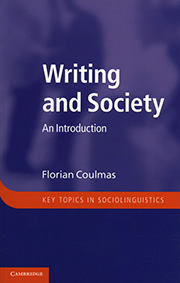
Details
2013, ISBN 978-1-107-60243-4, Cambridge University Press, New York, 180 p.Authors
Writing and Society
An Introduction

How does writing relate to speech? What impact does it have on social organization and development? How do unwritten languages differ from those that have a written form and tradition? This book is a general account of the place of writing in society. Drawing on contemporary and historical examples, from clay tablets to touch-screen displays, the book explores the function of writing and written language, analysing their consequences for language, society, economy and politics. lt examines the social causes of illiteracy, demonstrating that institutions of central importance to modern society are built upon writinq and written texts, and are characterized by specific forms of communication. It explores the social dimensions of spelling and writing reform, as well as of diqital literacy, a new mode of expression and communication posing novel challenges to the student of language in society.
- Demonstrates why writinq merits more attention within the study of language and society
- Draws on a wide variety of examples from different linguistic and cultural settings
- lnvestigates writing at the interface of technology, language behaviour and social development, inviting students to understand their own communication behaviour
- Discussion points in each chapter help students to absorb and reflect on what they have learnt
Contents
- The tyranny of writing and the dominance of vernacular speech
- The past in the present and the seeds of the public sphere
- Written and unwritten language
- Literacy and inequality
- The society of letters
- Writing reform
- Writing and literacy in the digitalized world
‘Shows a broad awareness of cultural history, coupled with a detailed knowledge of writing and its development, putting language, and written language in particular, at the core of human culture from Greek voting systems in the fifth century BCE to text messaging in the twenty-first AD. If only more linguists could write with the authority, the intellectual depth and the humanity displayed here.’
Vivian Cook, Emeritus Professor, Newcastle University
‘A masterpiece both because of its erudition and its coherent perspective.’
David Olson, University of Toronto